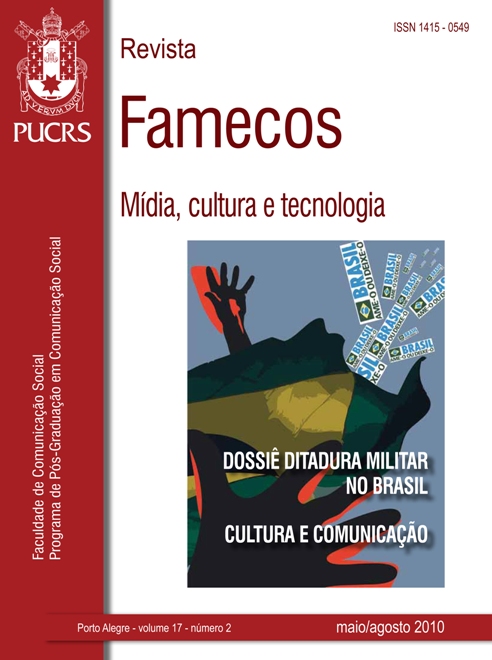Cuban blogosphere: a new public space for the construction of a plural and citizen society
DOI:
https://doi.org/10.15448/1980-3729.2010.2.7551Keywords:
Cyberspace, citizenship, cuban blogsAbstract
The reflection on cyberspace in the reconfiguration of public sphere, taking Cuban blogs as democratic practices in construction of citizenship, considered six Cuban blogs found on the web. The analysis of these blogs’ narratives allowed us to verify the recovery of the citizenship sense through the participation and free expression of the Cuban bloggers, because the blogs are spaces which enable the dialogue of themes of public interest. Through access, interactivity and net connection, the digital media allow new cultural practices, broadening and strengthening the belonging ties among citizens with common interests, favoring information exchange between local and global groups. Therefore, the communicational practices of blogs perform a roll of mediation in citizenship construction.Downloads
References
ARENDT, Hannah. Vies politiques. Paris: Gallimard, 1974.
_____. A condição humana. Rio de Janeiro: Forense, 1981.
BOBBIO, Norberto. A Era dos direitos. São Paulo: Editora Campus, 1992.
CUBA EN BLANCO Y NEGRO. Golpear a Yoanis? Si es solo un blogger. 13 nov. 2009. Disponível em: http://cubabn.wordpress.com Acesso em: 29 jan. 2010.
FLORIANI, Adriano W. ; MORIGI, Valdir J. Circuitos comunicativos e a construção da cidadania no ciberespaço; tramas de sentido em redes de weblogs. Revista Famecos: mídia, cultura e tecnologia, Porto Alegre, Edipucrs, v. 1, n. 30, p. 107-114, 2006.
GARRETÓN, Manuel A. Democracia, ciudadanía y medios de comunicación: un marco general. In: ORTIZ, Renato et al. Los medios: nuevas plazas para la democracia. Lima: Calandria, 2005, p. 102-103.
GARRETÓN, Manuel A. Democracia de Massas: jornalismo e cidadania: estudo sobre as sociedades contemporâneas e o direito dos cidadãos à informação. Porto Alegre: Edipucrs, 2005.
HOPENHAYN, Martin. América Latina desigual y descentrada. Buenos Aires: Ed. Norma, 2005.
LÉVY, Pierre. Ciberdemocracia. Lisboa: Instituto Piaget, 2002.
MARSHALL, Thomas. H. Cidadania, classe social e status. Rio de Janeiro: Zahar, 1967.
MATA, María Cristina. Comunicación y ciudadanía. Problemas teóricos-políticos de su articulación. Revista Fronteiras: estudos midiáticos. São Leopoldo: Unisinos VIII, n. 1, p. 5-15 jan./abr., 2006.
QUÉAU, Felippe. Cibercultura e info-ética. In: MORIN, Edgar. A Religação dos Saberes: o desafio do século XXI. Rio de Janeiro: Bertrand do Brasil, 2001, p. 460-480.
SÁNCHEZ, Yoani. Éramos tan pocos. 15 dez. 2009. Disponível em: http://www.desdecuba.com/generaciony Acesso em: 29 jan. 2010.
_____. Silenciar a un blogger. 12 jan. 2010. Disponível em: http://www.desdecuba.com/generaciony Acesso em: 29 jan. 2010.
SÁVON, Miguel Iturria. Como la luna. 8 jan. 2010. Disponível em: http://vocescubanas.com/anclainsular Acesso em 29 jan. 2010.
TELLES, Vera da Silva. Direitos sociais: afinal do que se trata? Belo Horizonte: UFMG, 2006.
TELLES, Vera da Silva. Espaço público e espaço privado na
constituição do social: notas sobre o pensamento de Hannah Arendt. Tempo Social, Departamento de Sociologia/USP, São Paulo, v. 2, n.1, p. 23-48, 1990.
VIEIRA, Liszt. Cidadania e Globalização. Rio de Janeiro: Record, 2001.
Downloads
How to Cite
Issue
Section
License
Copyright
The submission of originals to Revista Famecos implies the transfer by the authors of the right for publication. Authors retain copyright and grant the journal right of first publication. If the authors wish to include the same data into another publication, they must cite Revista Famecos as the site of original publication.
Creative Commons License
Except where otherwise specified, material published in this journal is licensed under a Creative Commons Attribution 4.0 International license, which allows unrestricted use, distribution and reproduction in any medium, provided the original publication is correctly cited.






